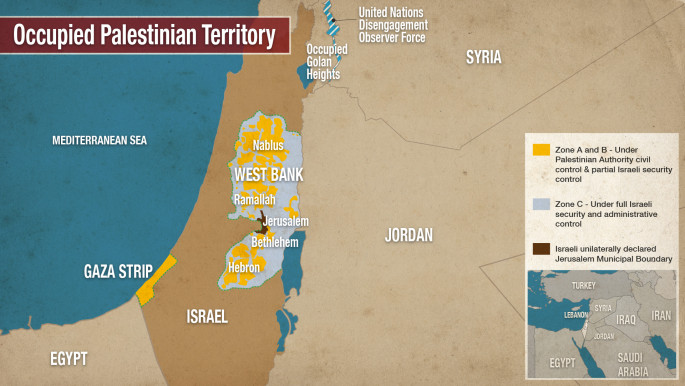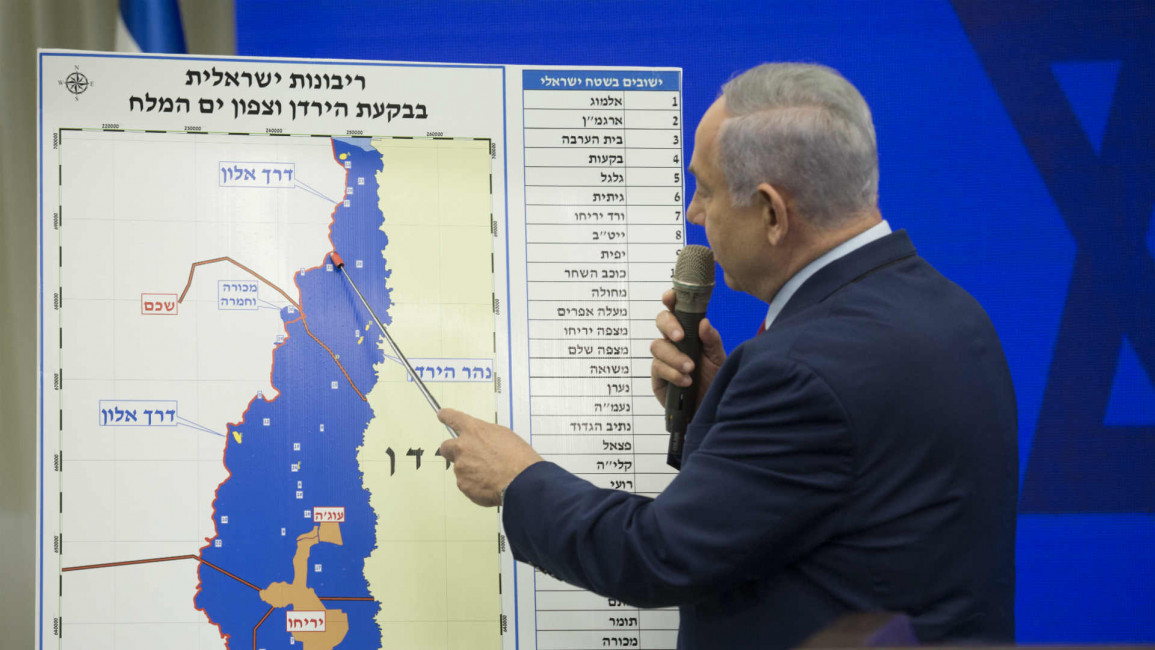Arab League slams Netanyahu plan to annex Jordan Valley as 'aggression'
The Arab League slammed Israeli Prime Minister Benjamin Netanyahu's pledge to annex the Jordan Valley in the occupied West Bank if re-elected in 17 September polls.
Arab foreign ministers condemned the plan Wednesday as an "aggression" which undermines the possibility of a peaceful resolution to the Israel-Palestine conflict, Reuters reported.
Arab foreign ministers said in a statement after a meeting in Cairo that the Arab League "considers his announcement a dangerous development and a new Israeli aggression by declaring the intention to violate the international law".
An emergency session was added to the Cairo meeting after Netanyahu's controversial announcement on live television.
The EU also warned Wednesday that Netanyahu's election pledge undermines chances for peace in the region, saying it would not recognise any change to Israel's borders that was not agreed by both sides.
"The policy of settlement construction and expansion... is illegal under international law and its continuation, and actions taken in this context, undermine the viability of the two-state solution and the prospects for a lasting peace," an EU spokesperson said in a statement.
 |
Palestinians immediately reacted to Netanyahu's pledge by saying the prime minister was destroying any hopes for peace, while his electoral opponents accused him of a cynical play for right-wing nationalist votes with polls only a week away.
In his televised speech, the prime minister also reiterated his intention to annex Israeli settlements in the wider West Bank if re-elected.
But he said he would do that in coordination with US President Donald Trump, whose long-awaited peace plan is expected to be unveiled sometime after the vote.
Those moves could effectively kill any remaining hopes for a two-state solution to the Israeli-Palestinian conflict, long the focus of international diplomacy.
"There is one place where we can apply Israeli sovereignty immediately after the elections," Netanyahu said during the address that included a map of the Jordan Valley on an easel next to him.
"If I receive from you, citizens of Israel, a clear mandate to do so... today I announce my intention to apply with the formation of the next government Israeli sovereignty over the Jordan Valley and northern Dead Sea."
Comment: Palestinians are right to reject Kushner's plan. A gilded cage is still a cage
Senior Palestinian official Hanan Ashrawi said Netanyahu was "not only destroying the two-state solution, he is destroying all chances of peace".
She called it "worse than apartheid".
'Great opportunity'
Saeb Erekat, the chief Palestinian negotiator, said the annexation would be "manifestly illegal" and called on the international community to act.
Jordan's Foreign Minister Ayman Safadi warned the move would "push the whole region towards violence" and risks "killing off the entire peace process".
In Turkey, Foreign Minister Mevlut Cavusoglu slammed Netanyahu's pledge as "racist".
|
"The election promise of Netanyahu, who is giving all kind of illegal, unlawful and aggressive messages before the election, is a racist apartheid state," Cavusoglu wrote on his official Twitter account in both English and Turkish.
Saudi Arabia condemned it as a "dangerous escalation against the Palestinian people" and called for an emergency meeting of foreign ministers from the 57 member states of the Organisation of Islamic Cooperation (OIC), the official Saudi Press Agency said, citing the royal court.
Qatar's ministry of foreign affairs also rejected the "infringement on the rights of the brotherly Palestinian people" and that the Israeli occupation "continued contempt of international laws and the imposition of the logic of force and de facto, will completely eliminate the chances of peace".
The Jordan Valley accounts for around one-third of the West Bank and Israeli right-wing politicians have long viewed the strategic area as a part of the territory they would never retreat from, seeing it as the country's eastern border.
Israeli settlements are located in what is known as Area C of the West Bank, which accounts for some 60 percent of the territory, including the vast majority of the Jordan Valley.
Netanyahu said his annexation plans would not include Palestinian cities, such as the Jordan Valley's Jericho, though it would be encircled by Israeli territory.
The premier said Trump's peace parameters "will place before us a great challenge and also a great opportunity".
"This is a historic, one-time opportunity to apply Israeli sovereignty on our settlements... and other places of importance to our security, our heritage and our future."
Trump has thrown US support overwhelmingly in favour of Israel since taking office, including by recognising Jerusalem as Israel's capital and cutting hundreds of millions of dollars in aid to the Palestinians.
Ahead of April elections, Trump recognised Israeli sovereignty over the occupied Golan Heights, seized from Syria in the 1967 war.
'Empty promise'
Netanyahu along with his right-wing and religious allies won a majority of seats in April polls, but he failed to form a coalition and opted for an unprecedented second election in five months.
He is again facing a difficult challenge from ex-military chief Benny Gantz and his centrist Blue and White alliance.
Gantz, who has in the past spoken of keeping the Jordan Valley under Israel's control forever, said "I have no doubt that this will be yet another empty promise because there is nothing behind it".
Right-wing nationalist votes will be key to Netanyahu's efforts to continue his reign as Israel's longest-serving prime minister.
"We understand that the prime minister has said that (annexation) is the carrot of Trump's plan, the question that remains is what is the stick, what will we have to give?" asked former justice minister Ayelet Shaked, who heads a union of far-right parties.
In-depth: The 1967 Arab-Israeli War and the making of today's Middle East
Netanyahu is also facing a potential indictment for corruption pending a hearing scheduled for early October.
Israel occupied the West Bank in the 1967 Six-Day War in a move never recognised by the international community.
Its settlements there are considered illegal under international law and major stumbling blocks to peace as they are built on land the Palestinian see as part of their future state.
 |
Israel says the Jordan Valley is vital to its security.
However, the fertile strip is a large part of the West Bank and would form an integral part of a future Palestinian state.
According to human rights group B'Tselem, the northern Dead Sea and the Jordan valley "constitute almost 30 percent of the West Bank. Nearly 65,000 Palestinians and some 11,000 [Israeli] settlers live there".
Despite Israel's currently occupation of the region, a formal annexation would lead to Israel's complete control over the region, spelling disaster for the Palestinians that currently live there and would be a further major blow to the viability of a Palestinian state.
Follow us on Twitter: @The_NewArab



